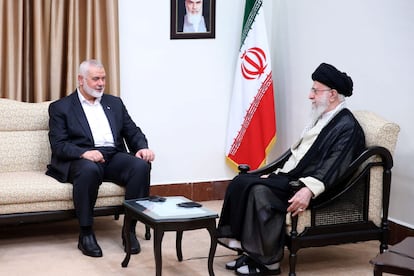Waiting for Iran’s response
Tehran’s brazen assassination of Hamas leader Ismail Haniyeh has fueled fears that the Gaza war could spread to the Middle East

The assassination of Hamas political leader Ismail Haniyeh is threatening to open a new front in Israel’s ongoing war against Hamas in Gaza over its October 7 massacre. Since that day, diplomatic efforts of the U.S. and its allies have largely focused on preventing the conflict from spilling over to the Middle East. The brutal Israeli response to the October 7 attack has not yet reversed the steps taken to de-escalate the conflict in the region (the Abraham Accords or the thaw between Saudi Arabia and Iran). All of that is up in the air again.
Beyond the effects that killing Haniyeh might have on the ceasefire Israel and Hamas were negotiating (with the mediation of Egypt and Qatar), striking him in Tehran constitutes a clear warning to Iran, the patron of the so-called Axis of Resistance, which includes the aforementioned Palestinian group. Opinions are divided between those who fear the response of the Islamic Republic and those who are convinced that the Iranian regime will not enter into a war to defend Hamas.
The former base their concerns on Iran’s official statements (“We consider it our duty to take vengeance,” said Supreme Leader Ali Khamenei). While the latter point to Iran’s actions since October 7, in particular Tehran’s measured response to the assassination by an Israeli missile of several Revolutionary Guard commanders in its Damascus consulate last April, and the disregard with which it reacted to the subsequent bombing of a military base in Isfahan. But Wednesday’s attack (which Israel has neither confirmed nor denied responsibility for) has heightened the risk: it was a strike against an officers’ residence in the capital of the Islamic Republic.
For one thing, it is a blow to Iran’s security apparatus, led by the powerful Revolutionary Guard. The timing, just hours after the inauguration of Masoud Pezeshkian as president, adds insult to injury. Israel’s ability to penetrate Iran’s anti-aircraft defenses is humiliating for a regime that continuously makes threats against the West in general, and Israel in particular. Only last week, the outgoing Minister of Intelligence, Esmail Khatib, boasted that his greatest achievement had been “breaking up [Israeli secret service] Mossad’s infiltration network.” But what seems to be broken, or at least badly damaged, is the internal structure of his department.
The Islamic Republic has found its match in Israeli Prime Minister Benjamin Netanyahu. While waiting for the “harsh punishment” that Khamenei has vowed to take against the “Zionist regime,” the brazen assassination of Haniyeh puts the new president in a difficult position. Pezeshkian’s top priorities (in particular, improving relations with the West, as its sanctions over the Iran nuclear program are crippling the economy) have been postponed by the urgency of retaliation, which in turn is sabotaging the chances of rapprochement with the West. Any possible negotiation to restore the nuclear agreement is up in the air. And Iran’s neighbors are watching with concern as tensions continue to rise.
Sign up for our weekly newsletter to get more English-language news coverage from EL PAÍS USA Edition
Tu suscripción se está usando en otro dispositivo
¿Quieres añadir otro usuario a tu suscripción?
Si continúas leyendo en este dispositivo, no se podrá leer en el otro.
FlechaTu suscripción se está usando en otro dispositivo y solo puedes acceder a EL PAÍS desde un dispositivo a la vez.
Si quieres compartir tu cuenta, cambia tu suscripción a la modalidad Premium, así podrás añadir otro usuario. Cada uno accederá con su propia cuenta de email, lo que os permitirá personalizar vuestra experiencia en EL PAÍS.
¿Tienes una suscripción de empresa? Accede aquí para contratar más cuentas.
En el caso de no saber quién está usando tu cuenta, te recomendamos cambiar tu contraseña aquí.
Si decides continuar compartiendo tu cuenta, este mensaje se mostrará en tu dispositivo y en el de la otra persona que está usando tu cuenta de forma indefinida, afectando a tu experiencia de lectura. Puedes consultar aquí los términos y condiciones de la suscripción digital.









































